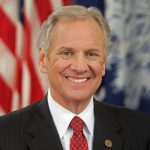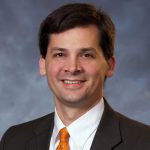
By Lindsay Street, Statehouse correspondent | In this “Year of Education” at the Statehouse, South Carolina likely won’t launch any new, innovative programs through its budget. But state leaders are seeking to shore up the beleaguered education system with teacher pay raises and an increase to the amount of money spent on every public school pupil.
Last week, House chief budget-writer Rep. Murrell Smith, R-Sumter, began wrapping up budget talks and, this week, the House Ways and Means Committee adopted reports from subcommittees. Smith spoke to Statehouse Report about what has surprised him about his first year chairing the House Ways and Means Committee.

“People … come to us and make requests for pilot projects or say, ‘We’ve got an answer to how we can improve education in South Carolina,’ and, to me, that’s emblematic of how we got in the situation we are,” Smith said. “You have to resist those requests.”
And while he called the ideas and current pilot programs worthy or meritorious, the proposed budget includes no new pilot programs for education.
Smith said that in recent years, pilot programs have grown from six lines to 112 lines. Education Oversight Committee (EOC) Executive Director Melanie Barton said the jump in one-time allocation of funds for education pilot programs began about six years ago.
Currently, education pilot programs are estimated at $5 million for programs through the EOC alone, Barton said. An estimate for programs run through the state Department of Education was not available but a spokesman said the number is likely less than the EOC. In last year’s budget, there are more than 45 lines with “pilot” in the provisos for the Department of Education.
- The EOC heads two of the largest pilot education programs in the state: Algebra Nation (a 2018 news story about its impact is available here) and Palmetto Digital Literacy (a 2018 report on its impact is available here). Both programs combined cost $2.8 million.
The brakes on pilot programs comes amid shrinking sales tax revenues — causing any money spent on the pilot programs to come from the general fund — but also shifting gears in the General Assembly as lawmakers try to make meaningful, holistic reform to public education in the state. Even with a projected $1 billion surplus, roughly $400 million is projected as recurring dollars and will quickly be snapped up by education initiatives, state employee pay raises and maintaining of the state’s increasingly expensive health and Medicaid plans.
“This year, it’s very clear that wholesale reform is needed and it’s stuff that’s been needed for over 20 years, so putting pilots on pause isn’t necessarily a bad thing,” education spokesman Ryan Brown said Thursday. “You got to have your core down before you can think about expanding the innovative part.”
In the House’s proposed budget, that core is mostly funding teacher salaries — an amount that dwarfs spending for pilot programs. The budget has set aside $159 million of recurring revenues to raise teacher salaries. The salaries would start at $35,000, a $3,000 increase over the current base salary, and offer 4- to 10.6-percent raises depending on length of time in the classroom.
“We’re going to take big steps towards raising the teacher pay,” Smith said.
‘A big win’
The state budget, by tradition, originates in the House. This year, it’s estimated at $9.3 billion.
Typically, the House passes its version by mid-March, the Senate passes its version by mid-April, and the legislature reconciles differences in May. The governor usually signs the budget into law by June.

On Thursday, Gov. Henry McMaster praised Smith’s budget-writing efforts, calling it “a big win” for the state that showed strong collaboration between the House leaders and the governor’s office.
But as the House readies to debate the budget in the coming weeks, there are two other items at play for education in Columbia:
- The massive education overhaul bill is currently being weighed by House Education and Public Works Committee and the Senate Education Committee. 3759 now offers a teacher’s bill of rights, starts new teacher pay at $35,000, and mirrors the House budget request for teacher raises. This bill will be debated in full committee next week. “But we can’t fund that in anticipation of the bill passing. We have to wait for the bill to pass,” Smith said.
- The state accounting office has been tasked with producing a report by May 9 on how the General Assembly funds and distributes education dollars in the state with the Education Finance Act. This is the base-student cost that districts get. Last month, McMaster, Lucas and Senate President Harvey Peeler asked the Revenue and Fiscal Affairs Office to review the formula. “There’s just no way we can do anything with the base-student cost when what we’ve requested is still pending,” Smith said.
A redefined metric and more in the budget
The proposed budget has a redefined new metric for education funding called “per-pupil cost” In the past, basic funding was called “base-student cost.” But the new metric includes these base costs plus teacher salaries and other items for school districts, according to Ways and Means Vice Chair Gilda Cobb-Hunter, D-Orangeburg. So comparing last year’s base-student cost of $2,485 to the new per-pupil cost is misleading, she said.
Here are some other highlights from other recurring fund expenses:
- State employees earning less than $100,000 will receive a 2 percent raise (an annual cost of $41.4 million);
- A $49.7 million bump in state health insurance plans; and,
- A $60 million bump in Medicaid spending.
There also is about $500 million that the state will see in non-recurring funds.
Perhaps the most historic item for non-recurring funds in the proposed Ways and Means budget is an income taxpayer rebate. Proposed in McMaster’s executive budgets, the taxpayer rebate was approved as part of provisos Thursday. Ways and Means staff could not find another example of such a rebate on the state level.
The rebate will take $35 million from non-recurring as taxpayer rebates and combine it with the $61 million the state should receive should the Simpsonville $1.5 billion lottery ticket be finally cashed in. Staff estimated the amount to equal $50 per taxpayer.

“There’s a lot of interest in the House to do that,” Smith said. S.C. Senate Majority Leader Shane Massey, R-Edgefield, told Statehouse Report that he was uncertain about how A taxpayer rebate would play in the Senate.
The House Ways and Means Committee budget also includes from non-recurring revenues:
- $40 million for the purchase of a new statewide voting system (See previous coverage here for the types of system being weighed);
- $85 million for a rural infrastructure fund to “lay the groundwork for industry to locate there,” Smith said; and,
- $100 million for higher education capital projects and deferred maintenance.
- Have a comment? Send to: feedback@statehousereport.com















 We Can Do Better, South Carolina!
We Can Do Better, South Carolina!